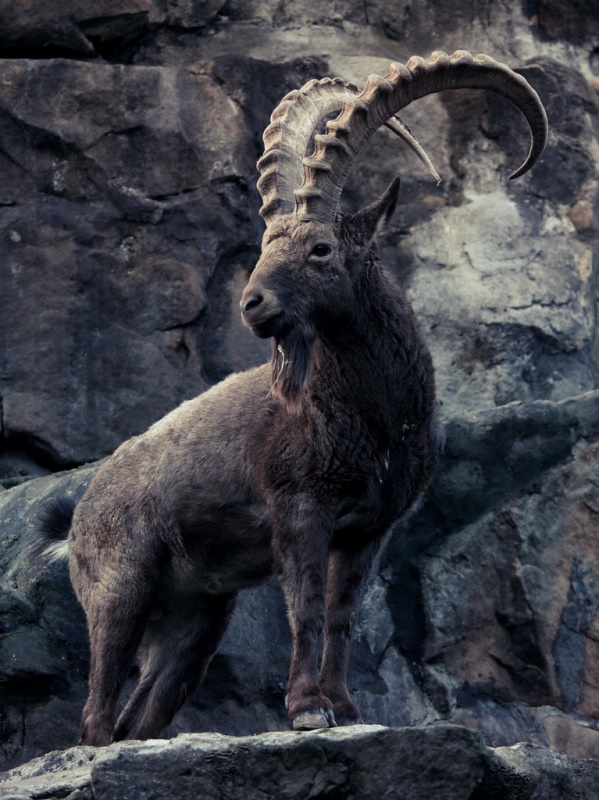
© Martin Teschner (CC BY-ND 2.0) https://creativecommons.org/licenses/by-nd/2.0/
As the world wakes up to the reality of climate change, scientists are looking ahead in order to quantify the potential effects of our changing environment on an already-endangered species. Researchers from Central State University (Wilberforce, OH) and NewMexico State University (Las Cruces, NM) worked in collaboration with the IUCN Species Survival Commission in producing a study which works to uncover the potential effects of changing climatic conditions on the distribution of the Asiatic ibex (Capra sibirica) in eastern Tajikistan.
The Asiatic ibex is a wild goat species which currently has a relatively wide distribution throughout Central and Northern Asia. A noteworthy feature displayed by males of the species are the long, curved horns which range between 91-148 cm in length (Salas et al, p 28). Snow leopards, brown bear, red fox, and wolves are all wild predators of the ibex, who also face human-influenced pressures such as over-grazing and illegal hunting. Ibices remain poorly studied and elusive by nature; with populations occurring at higher elevations than any other ungulate or hoofed mammal, the total population of the ibex is not known.
The migration of mountain species as a result of climate change has been documented to result in significant disruptions in patterns of species distribution and habitat use. Informed by these previous results, ecological niche modeling was utilized in this groundbreaking study to produce climate outcome projections through 2070. These projections sought to identify areas of both potential habitat gain and habitat loss through comparison of the most important factors in determining a habitat’s suitability for ibex populations. These critical factors were defined as elevation, terrain roughness, seasonal temperature, and precipitation during the warmest quarter of the year.
Ultimately, elevation was identified as the most influential factor over ibex distribution. Modeling the ibex population showed potential habitat losses of “15.1% by 2050 and to 17.7% by 2070,” (Salas et al., p 32). Despite this potential for losses in suitable habitat, the model also projected potential gains in habitat size in other locations across the study area, as much as “37.4% by 2050 and to 30.2% in 2070) (Salas et al., p 32). On average, the Siberian ibex stands to lose 18% of their current habitat distribution by 2070, but gain 30%.
The implications of this study reach far beyond the boundaries of the ibex’s habitat. The modeling techniques utilized by researchers in this context could potentially be applied to other at-risk ecosystems or species in order to begin to quantify the effects of climate change.
References:
Reading, R. & Shank, C. 2008. Capra sibirica . The IUCN Red List of Threatened Species 2008: e.T42398A10695735. https://dx.doi.org/10.2305/IUCN.UK.2008.RLTS.T42398A10695735.en.
Salas, E. A. L., Valdez, R., Michel, S., Boykin, K. G. 2020. Response of Asiatic ibex (Capra sibirica) under Climate Change Scenarios. Journal of resources and ecology 11(1): 27- 37.

Alex
"This title was very eye catching! That is so interesting that such a ..."
Alex
"This is really interesting! The fact that crops and plants are damaged is ..."
Alex
"Well done, this article is great and the information is very captivating! Ethics ..."
Alex
"I was intrigued throughout the whole article! This is such an interesting topic, ..."
Alex
"This is such an interesting article, and very relevant!! Great job at explaining ..."
Grandpa
"Honey You Did a good job I will forward to my eye doctor "
murphymv
"This article is fascinating because it delves into the details of the research ..."
murphymv
"I agree, adding the photo helped solidify the main finding. "
murphymv
"This is a fascinating finding. I hope this innovative approach to improving transplants ..."
Sherzilla
"This is a great article! I would really love to hear how exactly ..."
Sherzilla
"It's disappointment that these treatments were not very effective but hopefully other researchers ..."
Sherzilla
"I agree with your idea that we need to shift our focus to ..."
Sherzilla
"It's amazing to see how such an everyday household product such as ..."
Lauren Kageler
"I will be interested to see what the data looks like from the ..."
Lauren Kageler
"A very interesting article that emphasizes one of the many benefits that the ..."
maricha
"Great post! I had known about the plight of Little Browns, but I ..."
Sherzilla
"I assumed cancer patients were more at risk to the virus but I ..."
Sherzilla
"Great article! It sheds light on a topic that everyone is curious about. ..."
maricha
"This article is full of really important and relevant information! I really liked ..."
maricha
"Definitely a very newsworthy article! Nice job explaining the structure of the virus ..."
maricha
"It's interesting to think that humans aren't only species dealing with the global ..."
murphymv
"This is very interesting and well explained. I am not too familiar with ..."
Lauren Kageler
"Great article! This post is sure to be a useful resource for any ..."
Lauren Kageler
"Definitely seems like an odd pairing at first, but any step forward in ..."
murphymv
"What an interesting article! As you say, height and dementia seem unrelated at ..."
murphymv
"Great article! I learned several new methods of wildlife tracking. This seems like ..."
murphymv
"Very interesting topic! You explained cascade testing and its importance very well. I ..."
Alex
"This article is really interesting! What got me hooked right away was the ..."
Sabrina
"I found this article super interesting! It’s crazy how everyday products can cause ..."
Erin Heeschen
"I love the layout of this article; it's very eyecatching! The advancements of prosthetics ..."
murphymv
"Awesome article! I like the personality in the writing. Flash Graphene not only ..."
murphymv
"Very interesting work! I don't know a whole lot about genetics, but this ..."
Cami Meckley
"I think the idea of using virtual reality technology to better help prepare ..."
Erin Heeschen
"I wonder if there's a connection between tourist season and wildfires in the ..."
Ralph berezan
"Not bad Good work "
Michelle
"This sounds like it would be a great tool for medical students! ..."